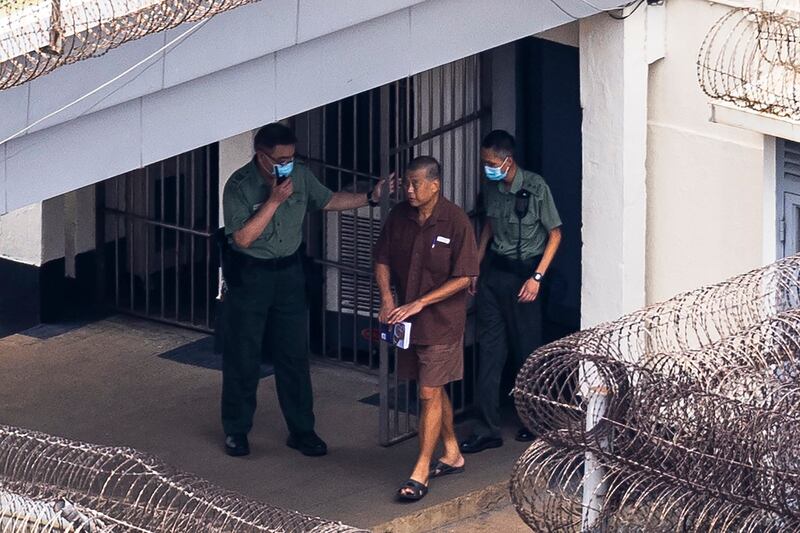Hong Kong media mogul Jimmy Lai’s legal team and son are being harassed with death and rape threats to discourage advocacy for the jailed pro-democracy businessman, his lawyer said Wednesday.
Caoilfhionn Gallagher of Doughty Street Chambers, a law firm with a focus on international human rights, told the Senate Foreign Relations Committee that Lai’s lawyers are regularly targeted by Hong Kong authorities, Chinese state media and anonymous internet users.
Gallagher said the coordinated campaign of abuse was heightened whenever she or Lai's son, Sebastien, were set to speak at high-profile events, with upticks, in particular, of threatening online messages.
“They come thick and fast on key days for the case,” she told the committee. “I woke up this morning to 17 different rape and death threats on a day when I’m giving evidence before this committee.”
Lai is the founder of clothing brand Giordano and pro-democracy Hong Kong newspaper Apple Daily. He was arrested in 2020 and charged with violating Hong Kong's national security law, and was then hit with a slew of extra charges, including fraud and illegal demonstration.

He was sentenced last year to five years and nine months in prison after being convicted of fraud, but is still awaiting trial for the original charges of violating the controversial national security law.
‘Comprehensive and sophisticated’
Gallagher said the online threats were only part of the transnational repression faced by Lai's support team, noting her team was frequently accused in Chinese state media of being "foreign agents" themselves committing crimes under Hong Kong's national security law.
“Importantly, none of us are Hong Kongers. None of us are in exile. None of us are dissidents,” Gallagher said, adding Lai was also accused of violating the law by employing foreign lawyers.
It had already been made clear to Sebastien that he would face criminal charges, like his father, if he ever returned to Hong Kong, she said. But the threats against the lawyers made even less sense.
“We are international lawyers working for our clients, seeking to hold China and Hong Kong to account for flagrant violations of generalized and fundamental rights protected by international law,” Gallagher said.
“The campaign by China/Hong Kong to silence dissent and critical voices and to shut down international scrutiny of their actions is comprehensive and sophisticated,” she said. “It extends to anyone, anywhere in the world who dares to question their narrative.”
Senate Foreign Relations Committee Chairman Ben Cardin, a Democrat from Maryland, replied that the testimony was “chilling information” that demonstrated autocracies like China were trying to export their repression into the world’s free societies.

“It really does present a damning situation where transnational repression is really eating at the core of our own democracy, because many of the victims are being persecuted because of participating here in the United States in our open society,” Cardin said.
“That is a direct attack on our system of government and it compromises our ability to get objective information,” he said.
Transnational repression
Freedom House President Michael Abramovitz told the committee he believed China was the “world leader” in transnational repression.
Abramovitz's organization on Wednesday released a report detailing 112 incidents of transnational repression committed against journalists by 26 governments since 2014. But he said China led the way.
“They conduct the most sophisticated, global and comprehensive transnational repression in the world,” Abramovitz said, explaining that Beijing targeted “ethnic and religious minorities, political dissidents, human rights activists, journalists and former insiders.”
"It's a full range of tactics, from direct attacks like kidnapping dissidents, co-opting other countries to detain their dissidents, and also, in the case of the Uyghurs," he said, "threatening their families to get their family members living in the free world to basically shut up."
Abramovitz said he believed it was near impossible to conjure tactics to discourage Beijing from pursuing such global tactics.
“It's very difficult to influence China directly,” he said.
But he pointed to China's efforts to " co-opt international fora like the [U.N.] Human Rights Council in Geneva" to help silence its advocacy, too, as something the United States should work to "combat."
The committee was also told about the potential ways in which exiled Chinese political dissidents could one day be targeted for reprisals.
Sen. Jeanne Shaheen, a Republican from New Hampshire, said she was concerned that the “extensive collection of DNA” of people in China would make it harder for dissidents to escape into safety.
Christo Grozev, a Bulgarian investigative journalist who co-founded the Bellingcat news outlet, replied that a comprehensive database would allow Beijing to eliminate the ability of foreign governments to "offer protection with the usual, traditional methods of witness protection."
“The one biometric that you cannot change is DNA,” he said. “You can change the face, you can change fingerprints, but you cannot change DNA. So theoretically, the Chinese government could use that to verify the identity of their enemies even after they've received protection.”
Edited by Malcolm Foster.
